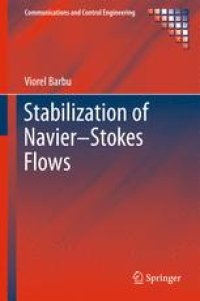
Ebook: Stabilization of Navier–Stokes Flows
Author: Viorel Barbu (auth.)
- Tags: Control, Systems Theory Control, Fluid- and Aerodynamics, Partial Differential Equations, Engineering Fluid Dynamics
- Series: Communications and Control Engineering
- Year: 2011
- Publisher: Springer-Verlag London
- Edition: 1
- Language: English
- pdf
Stabilization of Navier–Stokes Flows presents recent notable progress in the mathematical theory of stabilization of Newtonian fluid flows. Finite-dimensional feedback controllers are used to stabilize exponentially the equilibrium solutions of Navier–Stokes equations, reducing or eliminating turbulence. Stochastic stabilization and robustness of stabilizable feedback are also discussed. The text treats the questions:
• What is the structure of the stabilizing feedback controller?
• How can it be designed using a minimal set of eigenfunctions of the Stokes–Oseen operator?
The analysis developed here provides a rigorous pattern for the design of efficient stabilizable feedback controllers to meet the needs of practical problems and the conceptual controllers actually detailed will render the reader’s task of application easier still. Stabilization of Navier–Stokes Flows avoids the tedious and technical details often present in mathematical treatments of control and Navier–Stokes equations and will appeal to a sizeable audience of researchers and graduate students interested in the mathematics of flow and turbulence control and in Navier-Stokes equations in particular. The chief points of linear functional analysis, linear algebra, probability theory and general variational theory of elliptic, parabolic and Navier–Stokes equations are reviewed in an introductory chapter and at the end of chapters 3 and 4.
Stabilization of Navier–Stokes Flows presents recent notable progress in the mathematical theory of stabilization of Newtonian fluid flows. Finite-dimensional feedback controllers are used to stabilize exponentially the equilibrium solutions of Navier–Stokes equations, reducing or eliminating turbulence. Stochastic stabilization and robustness of stabilizable feedback are also discussed. The text treats the questions:
• What is the structure of the stabilizing feedback controller?
• How can it be designed using a minimal set of eigenfunctions of the Stokes–Oseen operator?
The analysis developed here provides a rigorous pattern for the design of efficient stabilizable feedback controllers to meet the needs of practical problems and the conceptual controllers actually detailed will render the reader’s task of application easier still. Stabilization of Navier–Stokes Flows avoids the tedious and technical details often present in mathematical treatments of control and Navier–Stokes equations and will appeal to a sizeable audience of researchers and graduate students interested in the mathematics of flow and turbulence control and in Navier-Stokes equations in particular. The chief points of linear functional analysis, linear algebra, probability theory and general variational theory of elliptic, parabolic and Navier–Stokes equations are reviewed in an introductory chapter and at the end of chapters 3 and 4.
Stabilization of Navier–Stokes Flows presents recent notable progress in the mathematical theory of stabilization of Newtonian fluid flows. Finite-dimensional feedback controllers are used to stabilize exponentially the equilibrium solutions of Navier–Stokes equations, reducing or eliminating turbulence. Stochastic stabilization and robustness of stabilizable feedback are also discussed. The text treats the questions:
• What is the structure of the stabilizing feedback controller?
• How can it be designed using a minimal set of eigenfunctions of the Stokes–Oseen operator?
The analysis developed here provides a rigorous pattern for the design of efficient stabilizable feedback controllers to meet the needs of practical problems and the conceptual controllers actually detailed will render the reader’s task of application easier still. Stabilization of Navier–Stokes Flows avoids the tedious and technical details often present in mathematical treatments of control and Navier–Stokes equations and will appeal to a sizeable audience of researchers and graduate students interested in the mathematics of flow and turbulence control and in Navier-Stokes equations in particular. The chief points of linear functional analysis, linear algebra, probability theory and general variational theory of elliptic, parabolic and Navier–Stokes equations are reviewed in an introductory chapter and at the end of chapters 3 and 4.
Content:
Front Matter....Pages I-XI
Preliminaries....Pages 1-24
Stabilization of Abstract Parabolic Systems....Pages 25-85
Stabilization of Navier–Stokes Flows....Pages 87-175
Stabilization by Noise of Navier–Stokes Equations....Pages 177-236
Robust Stabilization of the Navier–Stokes Equation via the H ?-Control Theory....Pages 237-270
Back Matter....Pages 271-276
Stabilization of Navier–Stokes Flows presents recent notable progress in the mathematical theory of stabilization of Newtonian fluid flows. Finite-dimensional feedback controllers are used to stabilize exponentially the equilibrium solutions of Navier–Stokes equations, reducing or eliminating turbulence. Stochastic stabilization and robustness of stabilizable feedback are also discussed. The text treats the questions:
• What is the structure of the stabilizing feedback controller?
• How can it be designed using a minimal set of eigenfunctions of the Stokes–Oseen operator?
The analysis developed here provides a rigorous pattern for the design of efficient stabilizable feedback controllers to meet the needs of practical problems and the conceptual controllers actually detailed will render the reader’s task of application easier still. Stabilization of Navier–Stokes Flows avoids the tedious and technical details often present in mathematical treatments of control and Navier–Stokes equations and will appeal to a sizeable audience of researchers and graduate students interested in the mathematics of flow and turbulence control and in Navier-Stokes equations in particular. The chief points of linear functional analysis, linear algebra, probability theory and general variational theory of elliptic, parabolic and Navier–Stokes equations are reviewed in an introductory chapter and at the end of chapters 3 and 4.
Content:
Front Matter....Pages I-XI
Preliminaries....Pages 1-24
Stabilization of Abstract Parabolic Systems....Pages 25-85
Stabilization of Navier–Stokes Flows....Pages 87-175
Stabilization by Noise of Navier–Stokes Equations....Pages 177-236
Robust Stabilization of the Navier–Stokes Equation via the H ?-Control Theory....Pages 237-270
Back Matter....Pages 271-276
....